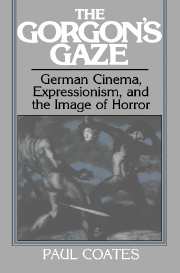Book contents
- Frontmatter
- Contents
- Preface
- Acknowledgments
- Introduction: The uncanny and the gorgon's gaze
- I Silent cinema and expressionism
- II The sleep of reason: Monstrosity and disavowal
- III Memory and repression in recent German cinema
- IV Expressionism in America
- V Elective affinities and family resemblances: For Margarethe von Trotta
- Appendixes
- Notes
- Selected bibliography
- Filmography
- Index
III - Memory and repression in recent German cinema
Published online by Cambridge University Press: 21 October 2009
- Frontmatter
- Contents
- Preface
- Acknowledgments
- Introduction: The uncanny and the gorgon's gaze
- I Silent cinema and expressionism
- II The sleep of reason: Monstrosity and disavowal
- III Memory and repression in recent German cinema
- IV Expressionism in America
- V Elective affinities and family resemblances: For Margarethe von Trotta
- Appendixes
- Notes
- Selected bibliography
- Filmography
- Index
Summary
On representation and repression
Representation is never neutral, for it is usually reserved for and by the strongest, who deem themselves the fittest to reproduce and be reproduced. And yet even when we are consciously aware of this we are still likely to concentrate so exclusively upon what the representation places before us that we fail to perceive what it omits. But if a society's prevailing modes of representation can therefore be experienced as uncanny, in league with evil, on the other hand omissions can be justified as the unavoidable corollary of the necessity of form: Structure is founded upon exclusion. In any case, is an event's omission always tantamount to its repression? This is one of the central questions the present chapter will address to a series of recent West German films.
Thinking the unthinkable
It is often contended that certain things are best left unrepresented, and that their omission from the visual sphere is a matter of tact rather than repression. Foremost among these are intimate sexual encounter and death, linked by Elizabethan puns on “dying” and critiques that speak of a “pornography of horror.”
- Type
- Chapter
- Information
- The Gorgon's GazeGerman Cinema, Expressionism, and the Image of Horror, pp. 108 - 155Publisher: Cambridge University PressPrint publication year: 1991

